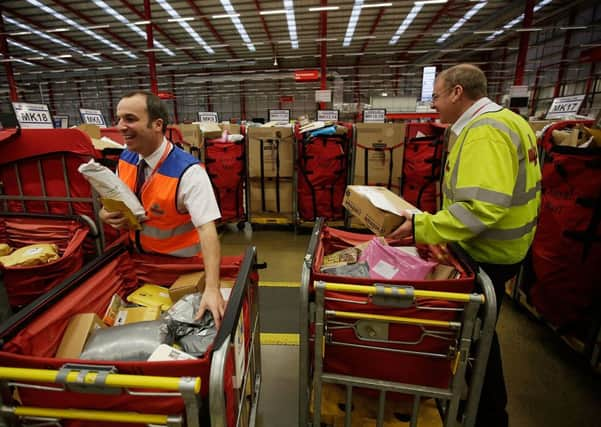Pass the parcel spoils the party


The share price, which had already been coming off highs of well over £6 after last October’s privatisation, amid allegations it had been sold off by the government on the cheap, fell nearly 3.5 per cent to 450p.
That was their lowest level since that sell-off and slashed £160 million off the company’s market value. Why the parcels shock is so important for the investment case for the business is that people have been sending fewer letters and more e-mails as the digital world has made giant strides with corporate and personal users.
Advertisement
Hide AdAdvertisement
Hide AdAll of a sudden the City saw the prized “defensive” parcels business in the UK coming under threat as well from aggressive rivals.
A typical reaction was that of broker Espirito Santo Investment Bank, which immediately slashed its estimates for Royal Mail’s parcels volume growth and revenues by 2 per cent and 4.6 per cent for 2015.
Royal Mail blamed strong competition from rivals “aggressively reducing prices”. In particular, it cited Amazon’s cut to the minimum order level for free delivery and the expansion of the huge online retailer’s own delivery network as significant factors behind the drop in parcel revenues.
As Amazon currently accounts for 6 per cent of the division’s turnover it was not difficult to see why fund managers were rattled.
Export parcel volumes were also hit by the strength of sterling.
Moya Greene, Royal Mail chief executive, said the parcels slide – mitigated by a better than expected performance in letters – had not currently changed internal profit expectations for the year. But she warned that parcels revenue would be “dependent on our performance in the second half, which includes the Christmas trading period, and on no further weakening in our addressable UK parcels market”.
Group revenues were still up 2 per cent over the period in line with expectations, as price increases produced a 3 per cent rise in UK letter revenues despite a 3 per cent drop in volumes. The City also took consolation from the fact that Royal Mail’s strong cost-cutting programme has so far offset the headwinds for UK parcels, and that the GLS European parcels business continues to thrive, with a 6 per cent rise in revenues.
However, a cloud even looms over the latter, as GLS is one of several mail firms being probed by the French competition authorities.
Advertisement
Hide AdAdvertisement
Hide AdRoyal Mail’s challenge is that rivals, typified by TNT Post UK in the crucial business of parcels and letters being delivered from big businesses to consumers, are cherry-picking the best business.
And they are doing it while not being hobbled by the British firm’s obligation to meet its universal service obligation.
Alex Patterson, an analyst with Espirito Santo, says: “The issue for Royal Mail is it has to deliver everywhere in the UK, from London and Glasgow to the Scottish islands and rural areas.
“Rival operators don’t face that problem. And the mail industry is so operationally geared. They have a fixed costbase so small losses in revenue can have a big impact.
“If Royal Mail, say, loses a million letters, delivering three letters for every five previously in the big city areas being targeted by rivals, you lose the revenue but it makes no difference to the costbase.”
So is all doom and gloom for the short-lived stock market blue-eyed boy? Not necessarily. Royal Mail is pressing regulator Ofcom for a more level playing-field with the new boys on the British post block, who it is currently estimated deliver to just 10 per cent of the UK’s physical geography.
“Royal Mail would like to stop its rivals cherry-picking the big city traffic, and, as one example, perhaps get the regulator to make them deliver six days a week, not just a few days,” one analyst said.
A setback for the group, however, is that Ofcom has said it will investigate the complaints of an unfair playing field post-privatisation by the end of 2015 rather than immediately.
Advertisement
Hide AdAdvertisement
Hide AdBulls, or to be more accurate, holders of the stock in the wake of last week’s chill wind, are also pinning hopes on the further cost-cutting potential at Royal Mail to help the competitive threat. And it could be considerable.
Patterson says: “Royal Mail will work more to cut costs. For instance, they are not automated at all in parcels compared to letters.
“Automating this business would mean less time in the sorting office and more time to deliver. It’s currently very time-intensive and we believe automation could mean a net saving of £450m a year over three years.
“That is a huge change as our estimates for the group’s operating profits this year is £493m. It is a key reason we are not sellers of the stock.”
Not all fund managers remain sympathetic to Royal Mail, however. One who failed to gain shares at privatisation said: “I thought the sell-off was despicable as it favoured select clients and froze out others. But even though I was interested in getting some shares at privatisation I now have growing doubts. Competition is clearly a massive threat for Royal Mail.
“I now have shares in DX Group, an AIM-listed business parcel delivery company, instead. I think the smaller mail operators have a clear advantage because they are nimbler and don’t have to deliver throughout Britain like Royal Mail.
“And I’m not sure their wooing of the regulator will bear fruit. Royal Mail are the dominant operator, still, with what many people would still think was a near-monopoly.”